

What is Privacy? New Research Reveals We May Need a New Definition. If you still believe your personal credit information is truly private, newly released research by a Rutgers professor may lead you to reconsider.
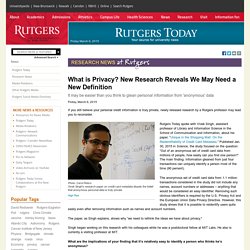
Vivek Singh's research paper on credit card metadata dispels the belief that anonymous personal data is truly private. Rutgers Today spoke with Vivek Singh, assistant professor of Library and Information Science in the School of Communication and Information, about his paper, “Unique in the Shopping Mall: On the Reidentifiability of Credit Card Metadata.” Published Jan. 30, 2015 in Science, the study focused on the question: “Out of an anonymous set of credit card data from millions of people, how easily can you find one person?” Eu-council-dp-reg-pseudonymisation-14705-rev1-14.pdf.
NYC taxi GPS. data. MIT research. Paul Ohm presentation anonymisation. The anonymization/de-identification debate moves to the FCC. Unique in the Crowd: The privacy bounds of human mobility : Scientific Reports. Uniqueness of human mobility In 1930, Edmond Locard showed that 12 points are needed to uniquely identify a fingerprint30.
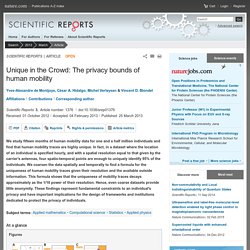
Our unicity test estimates the number of points p needed to uniquely identify the mobility trace of an individual. The fewer points needed, the more unique the traces are and the easier they would be to re-identify using outside information. There’s No Such Thing as Anonymous Data. Photo by Andrew Nguyen About a decade ago, a hacker said to me, flatly, “Assume every card in your wallet is compromised, and proceed accordingly.”
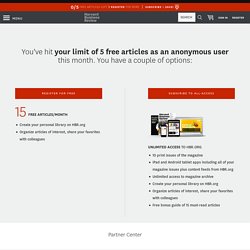
He was right. » Goodbye Internet Anonymity: Swedish Tabloids Publically Shame Forum Users.
People search - deanonimisation. Anonimysed DNA re-identified. You’re not anonymous. I know your name, email, and company. Sumit Suman recently visited a site, did not sign up for anything, did not connect via social media, but got a personal email from the site the next day.
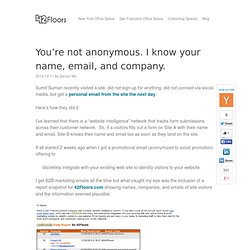
Here’s how they did it. I’ve learned that there is a “website intelligence” network that tracks form submissions across their customer network. So, if a visitors fills out a form on Site A with their name and email, Site B knows their name and email too as soon as they land on the site. It all started 2 weeks ago when I got a promotional email (anonymized to avoid promotion) offering to discretely integrate with your existing web site to identify visitors to your website. I get B2B marketing emails all the time but what caught my eye was the inclusion of a report snapshot for 42Floors.com showing names, companies, and emails of site visitors and the information seemed plausible.
Note the last sentence: Protecting the anonymity of cyberbullying victims. Save the Titanic: Hands-on anonymisation and risk control of publishing open data. Save the Titanic: Hands-on anonymisation and risk control of publishing open data This guide on anonymisation is based on a presentation at the OK festival on the 16th July 2014.
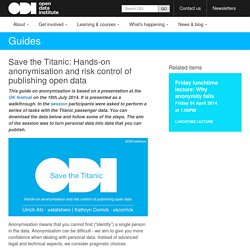
It is presented as a walkthrough. In the session participants were asked to perform a series of tasks with the Titanic passenger data. You can download the data below and follow some of the steps. The aim of the session was to turn personal data into data that you can publish. Anonymisation means that you cannot find (“identify”) a single person in the data. Why You Don’t Need to Hide Online Anymore...Or Do You? Me and my data: how much do the internet giants really know? To briefly state the obvious, the internet giants are seriously big: Google is not only the world's largest search engine, it's one of the top three email providers, a social network, and owner of the Blogger platform and the world's largest video site, YouTube.
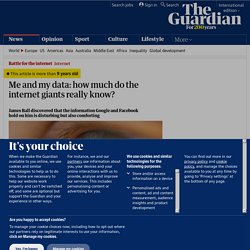
Facebook has the social contacts, messages, wallposts and photos of more than 750 million people. Given that such information could be used to sell us stuff, accessed by government or law enforcement bodies (perhaps without warrants, under legal changes), or – theoretically, at least – picked up by hackers or others, it's not unreasonable to wonder exactly how much the internet giants know about us. Can you really remain anonymous on the Internet? Anonymouth: A stylometry tool. Et vous vous croyez anonyme ? L'anonymat n'existe pas. Samedi 12 janvier 6 12 /01 /Jan 11:04 Il y a quelques temps de cela j'assistais à l’événement « Pas Sages en Seine 2012 ».
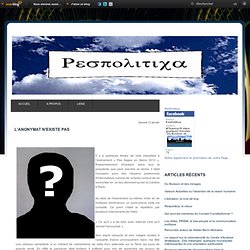
Rassemblement d'hackers dans tout la polysémie que peut prendre ce terme, il était l'occasion pour des citoyens passionnés d'informatique comme de simples curieux de se rencontrer en ce lieu étonnant qu'est la Cantine à Paris. Au delà de l'événement lui-même, riche en de multiples dimensions, un point précis exita ma curiosité. Ce point c'était la répétition par plusieurs intervenants de l'idée : Disruptions: Privacy Fades in Facebook Era. David Paul Morris/Bloomberg NewsPrivacy is a rare commodity today with the high amount of information being posted on social networking sites such as Facebook.
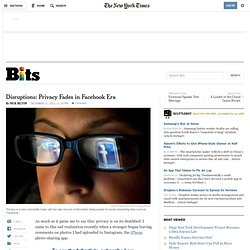
As much as it pains me to say this: privacy is on its deathbed. I came to this sad realization recently when a stranger began leaving comments on photos I had uploaded to Instagram, the iPhone photo-sharing app. How anonymous is NHS patient data? A claim by the Department of Health that patient data shared with private firms for medical research would be anonymised has been challenged by privacy campaigners.
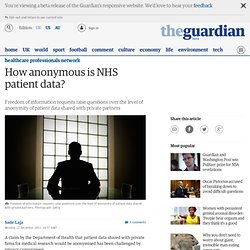
The prime minister said last week that plans to share records and other NHS data would make it easier to develop and test new drugs and treatments. The DH says all necessary safeguards would be in place to ensure protection of patients' details. But Ethics and Genetics, a social and technology campaign group, says freedom of information requests show that under certain circumstances data anonymity would not always be guaranteed. Security Clan Editor's Blog - Personal Data Mining: Government & Business Share Blame. Take Control of Your Online Image - PCWorld Business Center. OCR issues guidance on methods for de-identification of PHI. As mandated by the American Recovery and Reinvestment Act of 2009, on November 26, 2012, the U.S.
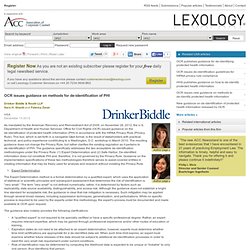
Department of Health and Human Services’ Office for Civil Rights (OCR) issued guidance on the de-identification of protected health information (PHI) in accordance with the HIPAA Privacy Rule (Privacy Rule). This tool, which is set forth in a navigable Q&A format, is the result of stakeholders with practical, technical, and policy experience contributing to a Washington, D.C. workshop in March 2010. The resulting guidance does not change the Privacy Rule, but rather clarifies the existing regulation as it pertains to de-identification of PHI. What You Don't Know about Your Online Reputation Can Hurt You - PCWorld Business Center. Social networking, and the broader concept of online privacy, have been under some rather intense scrutiny over the past couple of weeks.
The issues at Google--voracious indexer of all things Internet, and Facebook--the largest social network and number one most visited site (according to Google) have made many users more acutely aware of what information is available about them on the Internet. However, your online reputation is being used in ways you may not be aware of, and could cost you.